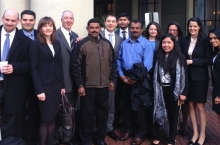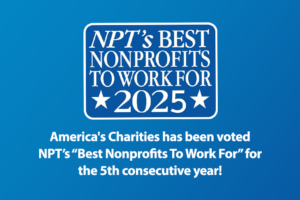Sarah Ford | January 12, 2015
SPLC goes to trial in first phase of one of largest human trafficking cases in U.S. history
Opening arguments begin today in a federal lawsuit brought by the SPLC on behalf of guest workers from India who were lured to a Mississippi shipyard by false promises of permanent U.S. residency only to find themselves forced into servitude and living under guard in an overcrowded, unsanitary labor camp.
The New Orleans trial is part of a seven-year legal battle against Signal International, a marine services company that operates in Mississippi, Alabama and Texas.
The trial, to be held before a jury in the U.S. District Court for the Eastern District of Louisiana, is the first in a series of suits spearheaded by the SPLC that together comprise one of the largest human trafficking cases in U.S. history.
“This is an extremely important case,” said lead attorney Alan Howard, chairman of the SPLC board and a partner in Crowell & Moring’s New York office. “We’re looking forward to presenting to a jury all of the facts about what happened to our clients, and our clients are excited about finally getting their day in court.”
Lawyers for the plaintiffs intend to show that Signal and a network of labor recruiters and an immigration attorney engineered a scheme not only to defraud the Indian workers but to use illegal coercion and threats to maintain control over them and keep them working at Signal. The recruiters and lawyer received millions of dollars in recruiting fees from the workers and Signal made millions in profits from their labor, but not one of the workers received what he was promised.
The case is a stark example of the shameful exploitation within the nation’s broken guest worker program.
The SPLC filed the suit in March 2008. When a judge did not grant class action status – a status that would have allowed the suit to benefit most of Signal’s guest workers – the SPLC coordinated an unprecedented legal collaboration. It brought together nearly a dozen of the nation’s top law firms and civil rights organizations to represent, on a pro bono basis, hundreds of other workers who had been excluded from the original SPLC suit by the denial of class action status.

Get Resources and Insights Straight To Your Inbox
Explore More Articles
For Fifth Consecutive Year America’s Charities Named ‘Best Nonprofit To Work For’
Washington, D.C. – April 1, 2025 – America’s Charities, the nonprofit that mobilizes the power of giving as a leading provider of volunteering, workplace giving,…
Read ArticleWorkplace Fundraising + Volunteering Summit (April 2nd and 3rd, 2025)
Join us in attending this virtual summit! The America’s Charities team is joining up with other leading voices in the workplace giving space for a…
Read ArticleThe Time to Act is Now
The results of the 2024 National Assessment of Educational Progress (NAEP) are in, and the findings are, in a word, heartbreaking. This assessment serves as…
Read ArticleGet Resources and Insights Straight To Your Inbox
Receive our monthly/bi-monthly newsletter filled with information about causes, nonprofit impact, and topics important for corporate social responsibility and employee engagement professionals, including disaster response, workplace giving, matching gifts, employee assistance funds, volunteering, scholarship award program management, grantmaking, and other philanthropic initiatives.




